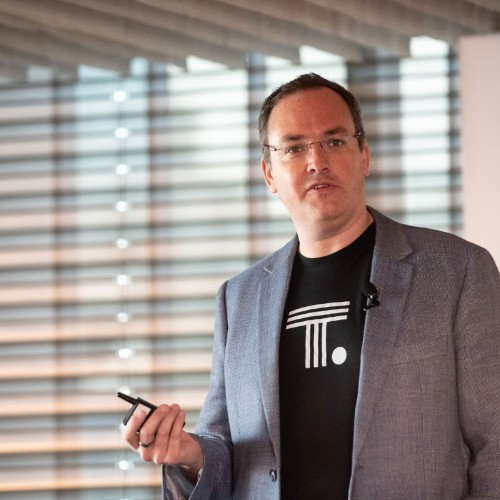
AI in Enterprise Focus Day
Strategic Governance & Analytics Focus Day
Chair’s opening remarks
Speaking:

Dr Omer Yezdani
Director (Chief Data Officer), Australian Catholic University
AI in Enterprise Focus Day
Audience Interactive: How can you Cement AI as a Critical Business Asset?
This 15-minute audience engagement session is open to the entire room. The Chair will share their opinion on the topic and then pass the ‘mic’ to the audience. Delegates will have the opportunity to voice out their insights, challenges and learnings through an open-mic set up. This will set the stage for future questions and encourage our speakers to address the delegates’ queries as we go through the day.
Audience Interactive: How can you Cement AI as a Critical Business Asset?
May 2 | 09:05 - 09:20
This 15-minute audience engagement session is open to the entire room. The Chair will share their opinion on the topic and then pass the ‘mic’ to the audience. Delegates will have the opportunity to voice out their insights, challenges and learnings through an open-mic set up. This will set the stage for future questions and encourage our speakers to address the delegates’ queries as we go through the day.
Speaking:
Strategic Governance & Analytics Focus Day
Audience Interactive: What is your Greatest Data Management Challenge?
This 15-minute audience engagement session is open to the entire room. The Chair will share their opinion on the topic and then pass the ‘mic’ to the audience. Delegates will have the opportunity to voice out their insights, challenges and learnings through an open-mic set up. This will set the stage for future questions and encourage our speakers to address the delegates’ queries as we go through the day.
Audience Interactive: What is your Greatest Data Management Challenge?
May 2 | 09:05 - 09:20
This 15-minute audience engagement session is open to the entire room. The Chair will share their opinion on the topic and then pass the ‘mic’ to the audience. Delegates will have the opportunity to voice out their insights, challenges and learnings through an open-mic set up. This will set the stage for future questions and encourage our speakers to address the delegates’ queries as we go through the day.
Speaking:
AI in Enterprise Focus Day
Keynote Presentation: AI and Ethics: The Moral Complexities of Innovating in the Digital Age
Exploring the vulnerabilities that AI can bring in terms of ethics and how to avoid bias in the decision-making process.
Speaking:

Jade Haar
Head of Data Ethics, NAB
Strategic Governance & Analytics Focus Day
Keynote Presentation: How Data literacy and storytelling are the next key skills for Data teams
Enhancing your organisation’s data literacy and confidence will take your organisation towards greater efficiency, credibility, and increase the effectiveness of your business decisions.
Within the next few years the area of Data Literacy, and the services around it, will be as common in D&A teams as reporting and data warehousing is today. Businesses need to be doing something, or at least planning something, with respect to Data Literacy, now. This session will examine:
- Data Literacy – what does this actually look like and how to make this part of your organisation?
- Democratisation of data - how to put useful data in hands of the business
- Improving your team’s story telling skills to turn data into actionable insights
- Establishing the business context of your data - What are the numbers actually saying?
Speaking:

Stuart Moseley
Chief Data Officer, Converge International
Keynote Presentation: How Data literacy and storytelling are the next key skills for Data teams
May 2 | 09:20 - 09:45
Enhancing your organisation’s data literacy and confidence will take your organisation towards greater efficiency, credibility, and increase the effectiveness of your business decisions.
Within the next few years the area of Data Literacy, and the services around it, will be as common in D&A teams as reporting and data warehousing is today. Businesses need to be doing something, or at least planning something, with respect to Data Literacy, now. This session will examine:
- Data Literacy – what does this actually look like and how to make this part of your organisation?
- Democratisation of data - how to put useful data in hands of the business
- Improving your team’s story telling skills to turn data into actionable insights
- Establishing the business context of your data - What are the numbers actually saying?
Speaking:
AI in Enterprise Focus Day
From R&D to ROI: Realise Value by Operationalizing Machine Learning
Why do machine learning projects fail and why do the majority of ML models never reach production despite how powerful the technology can be? In this session, Diego draws from his experience consulting global clients, to share insights on building MLOps strategy and practical advice for managing the machine learning lifecycle through automation and scaling rapidly with model governance at the core.
Speaking:

Diego Oppenheimer
Diego Oppenheimer, Executive Vice President, MLOps, DataRobot
From R&D to ROI: Realise Value by Operationalizing Machine Learning
May 2 | 09:50 - 10:20
Why do machine learning projects fail and why do the majority of ML models never reach production despite how powerful the technology can be? In this session, Diego draws from his experience consulting global clients, to share insights on building MLOps strategy and practical advice for managing the machine learning lifecycle through automation and scaling rapidly with model governance at the core.
Speaking:
Strategic Governance & Analytics Focus Day
Data Mesh: Scalable analytical data management
As every organisation’s data landscape continues to advance and evolve, so too must its approach to analytical data.
In this presentation, we look at the data mesh approach, focusing on its core concepts of:
- Domain ownership
- Data-as-a-product
- Self-service infrastructure
- Federated governance
Speaking:

Brett Chase
Senior Manager, Sales Engineering, APAC, Collibra
Data Mesh: Scalable analytical data management
May 2 | 09:50 - 10:20
As every organisation’s data landscape continues to advance and evolve, so too must its approach to analytical data.
In this presentation, we look at the data mesh approach, focusing on its core concepts of:
- Domain ownership
- Data-as-a-product
- Self-service infrastructure
- Federated governance
Speaking:
AI in Enterprise Focus Day
AI & Analytics Panel: Intelligent Technology: What Should an AI-Savvy Company Look Like?
- Choosing the Intelligence strategy that meets your needs
- From theory to practice: What needs to change to make AI work?
- Identifying and rectifying vulnerabilities
- Applying AI-driven processes and information to the decision-making process
Speaking:

Bhavika Unnadkat
Head of Data, Momentum Energy

Michelle-Joy Low
Head of Data & AI, Reece Group

Rose Skandari
Data Science Manager, BP Australia

Manohar Esarapu
Chief Information and Innovation Officer, Digital and Technology Services, City of Port Phillip
AI & Analytics Panel: Intelligent Technology: What Should an AI-Savvy Company Look Like?
May 2 | 10:20 - 10:50
- Choosing the Intelligence strategy that meets your needs
- From theory to practice: What needs to change to make AI work?
- Identifying and rectifying vulnerabilities
- Applying AI-driven processes and information to the decision-making process
Speaking:
Strategic Governance & Analytics Focus Day
Keynote Presentation: Operationalising Data Policies
Turning the policy framework into a working process, this session will highlight the steps needed to operationalise your data.
Speaking:

Brett Woolley
Head of Data Strategy & Governance, QBE Insurance
AI in Enterprise Focus Day
Getting Value from AI at Scale
The Journey of AT&T, CBA, and other H2O customers.
Speaking:

Philip Grenfell
Solution Engineering Lead, Australia & New Zealand, H2O.ai
Strategic Governance & Analytics Focus Day
Data Mesh for Business and Technology - Rethinking deployment in a modern world
The trends around data governance seem to be moving away from enterprise wide governance programmes, to more discreet business unit focused endeavours. What does this look like in practice?
Speaking:

Nathan Green
APJ Architecture Leader, Teradata
Data Mesh for Business and Technology - Rethinking deployment in a modern world
May 2 | 10:50 - 11:20
The trends around data governance seem to be moving away from enterprise wide governance programmes, to more discreet business unit focused endeavours. What does this look like in practice?
Speaking:
AI in Enterprise Focus Day
Strategic Governance & Analytics Focus Day
AI in Enterprise Focus Day
Continuous Intelligence: how you can start your AI journey with only a small amount of data
- If you think you don't have sufficient data to benefit from ML this session will make you think again!
- Today, as more companies begin to experiment with and deploy machine learning in different settings, the typical sequence is to gather data, learn some underlying structure then deploy an algorithm to systematically capture what you’ve learned.
- However the gathering, preparing, and enriching the right data is essential, yet data insufficiency remains a key barrier to many companies wanting to utilise machine learning.
- In this talk, we will discuss how Continuos Intelligence can provide an adaptable, scalable and highly effective solution to the problem of data insufficiency.
Speaking:

Dr Omid Karr
Director of AI Solutions, Ambiata
Continuous Intelligence: how you can start your AI journey with only a small amount of data
October 1 | 11:50 - 12:20
- If you think you don't have sufficient data to benefit from ML this session will make you think again!
- Today, as more companies begin to experiment with and deploy machine learning in different settings, the typical sequence is to gather data, learn some underlying structure then deploy an algorithm to systematically capture what you’ve learned.
- However the gathering, preparing, and enriching the right data is essential, yet data insufficiency remains a key barrier to many companies wanting to utilise machine learning.
- In this talk, we will discuss how Continuos Intelligence can provide an adaptable, scalable and highly effective solution to the problem of data insufficiency.
Speaking:
Strategic Governance & Analytics Focus Day
Data Governance Panel: Key Considerations: Data Governance, Privacy and Ethics
- How effective can protections around data be?
- Tackling the inherent tension between open data and privacy – how to bridge the gap between security and public engagement?
- Successful strategies to champion governance initiatives.
- How should data ethics inform your policy?
Speaking:

Benedict Chiu
Head of Data and Technology, Australian Conservation Foundation

Kathryn Gulifa
Chief Data & Analytics Officer, WorkSafe Victoria

Jan Lambrechts
Data Ethics Lead, ANZ

Sandeep Shankar
Head of Data Enablement, iSelect
Data Governance Panel: Key Considerations: Data Governance, Privacy and Ethics
May 2 | 11:50 - 12:20
- How effective can protections around data be?
- Tackling the inherent tension between open data and privacy – how to bridge the gap between security and public engagement?
- Successful strategies to champion governance initiatives.
- How should data ethics inform your policy?
Speaking:
AI in Enterprise Focus Day
Building Ethical Data/AI systems - From Principles to Practice
This session will look at how AI and Automation can work together to drive better business outcomes and improve data-driven performances.
Speaking:

Dr. Piyush Madhamshettiwar
Enterprise Data/AI Architect & Scientist, Covid Quarantine Victoria
Strategic Governance & Analytics Focus Day
Primed for Success: Maintaining a Single Source of Truth and Effectively Managing Data Quality
Speaking:

Suresh Bhaskaran
Head of Investment Analytics & Data Services APAC, BNP Paribas
AI in Enterprise Focus Day
Strategic Governance & Analytics Focus Day
AI in Enterprise Focus Day
Presentation: Extending Conway’s law to data – what Data & AI says about your organisation
Conway’s Law – organisations design systems that mirror their communication structures – is a guiding principle that has shaped software engineering management thinking for decades. But how can executives leading Data and AI transformations apply this paradigm to succeed? We explore:
- Extending Conway’s Law to Data
- What the quality of data / AI says about your organisation’s culture
- Why ownership and accountability is key; and
- How organisation structures influence Data and AI Transformations.
Speaking:

Michelle-Joy Low
Head of Data & AI, Reece Group
Presentation: Extending Conway’s law to data – what Data & AI says about your organisation
May 2 | 13:50 - 14:20
Conway’s Law – organisations design systems that mirror their communication structures – is a guiding principle that has shaped software engineering management thinking for decades. But how can executives leading Data and AI transformations apply this paradigm to succeed? We explore:
- Extending Conway’s Law to Data
- What the quality of data / AI says about your organisation’s culture
- Why ownership and accountability is key; and
- How organisation structures influence Data and AI Transformations.
Speaking:
Strategic Governance & Analytics Focus Day
Presentation: Data Mesh - Empowering Organisational Domains to own their Data Products whilst Leveraging a Common Governance framework
- Deciding the critical data elements of each business
- A risk based approach to data quality and lineage
- Private information and how to manage it
- Ensuring Data risk is minimised from a strategic and operational point of view
- Managing issues of stewardship and custodianship
- Where is our data and what data do we have? Why is there a habit of always collecting?
- Life cycle management and data disposal
- How the data asset is required, acquired and used
- Using awareness and education to encourage business units to take more ownership of their data
- Bringing the data under the appropriate technical controls
Speaking:

Adam Gould
Head of Data Enablement, ANZx at ANZ
Presentation: Data Mesh - Empowering Organisational Domains to own their Data Products whilst Leveraging a Common Governance framework
May 2 | 13:50 - 14:20
- Deciding the critical data elements of each business
- A risk based approach to data quality and lineage
- Private information and how to manage it
- Ensuring Data risk is minimised from a strategic and operational point of view
- Managing issues of stewardship and custodianship
- Where is our data and what data do we have? Why is there a habit of always collecting?
- Life cycle management and data disposal
- How the data asset is required, acquired and used
- Using awareness and education to encourage business units to take more ownership of their data
- Bringing the data under the appropriate technical controls
Speaking:
AI in Enterprise Focus Day
Presentation: AI-Powered Engagement: Personalisation & The Customer Experience
Look at how AI-based personalisation will open up markets and drive growth.
Speaking:

Fahad Najeeb
Head of Data Platforms & Engineering, Latitude Financial Services
Strategic Governance & Analytics Focus Day
Presentation: Leading a cultural transformation for data analytics success
Speaking:

Dr Omer Yezdani
Director (Chief Data Officer), Australian Catholic University
AI in Enterprise Focus Day
Strategic Governance & Analytics Focus Day
AI in Enterprise Focus Day
Roundtable Deep Dive: The Future is AI: The Role AI will Play in the Next 2 Years and Why you Need to Jump on the Intelligence Bandwagon
Delegates will choose a topic to discuss with their peers.
- How you plan for an AI-specific Digital Transformation Journey?
- Overcoming Barriers in AI Implementation?
- Workforce and AI integration – How they work together to grow the business
- Maintaining your Intelligence Programmes: AI delivery and monitoring strategies
Speaking:

Dmitri Markman
Executive, Personal Banking Data and Analytics, NAB

Alex Ji
Chief Information Officer, New Aim
Roundtable Deep Dive: The Future is AI: The Role AI will Play in the Next 2 Years and Why you Need to Jump on the Intelligence Bandwagon
May 2 | 15:20 - 16:20
Delegates will choose a topic to discuss with their peers.
- How you plan for an AI-specific Digital Transformation Journey?
- Overcoming Barriers in AI Implementation?
- Workforce and AI integration – How they work together to grow the business
- Maintaining your Intelligence Programmes: AI delivery and monitoring strategies
Speaking:
Strategic Governance & Analytics Focus Day
Roundtable Deep Dive: Viewing Data Governance through a Risk Lens
- Deciding the critical data elements of each business
- A risk based approach to data quality and lineage
- Private information and how to manage it
- Ensuring Data risk is minimised from a strategic and operational point of view
- Managing issues of stewardship and custodianship
- Where is our data and what data do we have? Why is there a habit of always collecting?
- Life cycle management and data disposal
- How the data asset is required, acquired and used
- Using awareness and education to encourage business units to take more ownership of their data
- Bringing the data under the appropriate technical controls
Speaking:

Trisha Lee
Head of Data Risk & Compliance, ANZ

David Wallace-Lemmon
Head of Business/Data Governance and Controls - Digital and Australia Transformation, ANZ
Roundtable Deep Dive: Viewing Data Governance through a Risk Lens
May 2 | 15:20 - 16:20
- Deciding the critical data elements of each business
- A risk based approach to data quality and lineage
- Private information and how to manage it
- Ensuring Data risk is minimised from a strategic and operational point of view
- Managing issues of stewardship and custodianship
- Where is our data and what data do we have? Why is there a habit of always collecting?
- Life cycle management and data disposal
- How the data asset is required, acquired and used
- Using awareness and education to encourage business units to take more ownership of their data
- Bringing the data under the appropriate technical controls
Speaking:
AI in Enterprise Focus Day
Strategic Governance & Analytics Focus Day
Day One Morning
Opening remarks from the Chair
Speaking:

Jonas Christensen
Head of Analytics and Customer Banking, ME Bank
Day One Morning
International Keynote Presentation: Collaborative Growth – Successfully integrating data into the business
Not only do we have a keynote insights talk with a visionary international data leader but an opportunity for the community to engage and refresh their thinking.
Speaking:

Harleen Thethy
Head of Analytics, BBC Global News
International Keynote Presentation: Collaborative Growth – Successfully integrating data into the business
May 3 | 08:55 - 09:35
Not only do we have a keynote insights talk with a visionary international data leader but an opportunity for the community to engage and refresh their thinking.
Speaking:
Day One Morning
Small Team, Big Dream - Accelerating Adoption through a Successful Data Driven Culture
Speaking:

Betty Thai
Head of Data & Analytics, Accent Group
Day One Morning
Make confident decisions, everyday, with Analytics and AI
Organisations have been pouring money into analytics initiatives for years but too few see the payoff. Insights aren't generated quickly, models aren't in production and pipelines go stale. This may be your experience and it doesn't have to be this way. Join us to hear how organisations have navigated this path from beginning to end and unlocked previously unimaginable value from their data.
Speaking:

James Malizis
Director of Customer Advisory, Australia and New Zealand, SAS
Make confident decisions, everyday, with Analytics and AI
May 3 | 10:00 - 10:25
Organisations have been pouring money into analytics initiatives for years but too few see the payoff. Insights aren't generated quickly, models aren't in production and pipelines go stale. This may be your experience and it doesn't have to be this way. Join us to hear how organisations have navigated this path from beginning to end and unlocked previously unimaginable value from their data.
Speaking:
Day One Morning
Keynote Presentation: Data-Driven Intelligence in the New Era
Speaking:

Sam Riethmuller
Head of Advanced Analytics, Coles
Day One Morning
Day One Morning
Data platform modernization: How can organizations unlock the true value of their data?
In the rapidly changing data science and analytics space, even the most mature organizations struggle with their data-driven transformation with multiple data sets across various environments. Organizations need an unified and robust platform that supports cloud and on-premise to accelerate their AI and ML solutions. This session will provide the organizations the key to truly unlock their data with a modernized data platform that scales easily as they grow.
- How a unified platform in a single data fabric opens door to modernization with a cloud-native system
- Multi-cloud and multi-location environment that is cost-effective for future scale
- Success stories in modernizing your data platform
Speaking:

Robert Christiansen
VP, Strategy - Office of the CTO, Hewlett Packard Enterprise
Data platform modernization: How can organizations unlock the true value of their data?
May 3 | 11:20 - 11:45
In the rapidly changing data science and analytics space, even the most mature organizations struggle with their data-driven transformation with multiple data sets across various environments. Organizations need an unified and robust platform that supports cloud and on-premise to accelerate their AI and ML solutions. This session will provide the organizations the key to truly unlock their data with a modernized data platform that scales easily as they grow.
- How a unified platform in a single data fabric opens door to modernization with a cloud-native system
- Multi-cloud and multi-location environment that is cost-effective for future scale
- Success stories in modernizing your data platform
Speaking:
Day One Morning
Accelerating Adoption through a Successful Data Driven Culture
How to empower your teams with the ability to access the data they need when they need it.
Speaking:

Michelle Pinheiro
Head of Enterprise Data Governance, ANZ
Day One Morning
The Democratisation of Analytics - Scale the Impact of Analytics Across the Organisation
It’s no secret that smart organisations want to make more decisions fueled by data and analytics – but relatively few have breakthrough success. A recent study showed that 97% of organisations are investing in big data and AI technologies but only 23% report being data driven. What’s the bottleneck? Complex disparate data silos, a lack of data and analytic talent, inefficient and manual processes, and a lack of data literacy remain top inhibitors. What if an organisation could upskill its workforce so all business teams and knowledge workers could use data and analytics to solve their companies most vexing challenges? There is a way – a proven method – that helps organisations democratise analytics across an organisation.
Join this session to understand:
- The stages of analytics maturity
- The divide between people and technology
- The unbalanced spending on data and analytics technologies
- A better way to do things – democratise analytics
Speaking:

Heidi Badgery
Managing Director, Alteryx (ANZ)
The Democratisation of Analytics - Scale the Impact of Analytics Across the Organisation
May 3 | 12:10 - 12:35
It’s no secret that smart organisations want to make more decisions fueled by data and analytics – but relatively few have breakthrough success. A recent study showed that 97% of organisations are investing in big data and AI technologies but only 23% report being data driven. What’s the bottleneck? Complex disparate data silos, a lack of data and analytic talent, inefficient and manual processes, and a lack of data literacy remain top inhibitors. What if an organisation could upskill its workforce so all business teams and knowledge workers could use data and analytics to solve their companies most vexing challenges? There is a way – a proven method – that helps organisations democratise analytics across an organisation.
Join this session to understand:
- The stages of analytics maturity
- The divide between people and technology
- The unbalanced spending on data and analytics technologies
- A better way to do things – democratise analytics
Speaking:
Day One Morning
Keynote Panel Discussion: Ready for What’s Coming Next: What do Data & Analytics Leaders Need to do to Adapt, Survive & Thrive in 2022 and Beyond?
- How do you balance developing a strategic approach to data and analytics, with the need to remain flexible to adapt to the changing needs, priorities and goals of the wider organisation?
- How can you ensure that you are best positioned to successfully tackle future challenges and exploit upcoming opportunities?
- What are the true requirements for effective leadership in the future?
- How can you position data analytics as crucial for the long term, not just the immediate future?
Speaking:

Rohan Persaud
Director of Channels and Alliances, Sisense

Elisa Koch
Head of Data, AFL – Australia Football League

Janice Carey
Former Head of Data Strategy, Chief Customer and Strategy Office, Bupa

Andrea Wecke
Chief Data and Analytics Officer, Eastern Health

Kris Gardiner
Head of Data and Analytics, Linfox Logistics
Keynote Panel Discussion: Ready for What’s Coming Next: What do Data & Analytics Leaders Need to do to Adapt, Survive & Thrive in 2022 and Beyond?
May 3 | 12:35 - 13:10
- How do you balance developing a strategic approach to data and analytics, with the need to remain flexible to adapt to the changing needs, priorities and goals of the wider organisation?
- How can you ensure that you are best positioned to successfully tackle future challenges and exploit upcoming opportunities?
- What are the true requirements for effective leadership in the future?
- How can you position data analytics as crucial for the long term, not just the immediate future?
Speaking:
Day One Morning
Track A Governance and Data-Savvy Organisations
Unlocking your Investment in Customer Data
- What are we investing in, and why does it continue to fail to deliver customer data and analytics?
- How do we evaluate what capability gaps exist?
- What emerging technologies exist?
- Build or buy: What principles will guide our decision?
- How does it all come together to deliver the CX promise?
- A data and analytics roadmap for CX.
Speaking:

Alan Bluwol
Director and Head of Customer Engagement, Servian
Unlocking your Investment in Customer Data
May 3 | 14:25 - 15:00
- What are we investing in, and why does it continue to fail to deliver customer data and analytics?
- How do we evaluate what capability gaps exist?
- What emerging technologies exist?
- Build or buy: What principles will guide our decision?
- How does it all come together to deliver the CX promise?
- A data and analytics roadmap for CX.
Speaking:
Track B Scaling an Innovative Enterprise
Achieving ‘sold out’: How personalisation took us there
The table stakes for personalisation have been increasing ever since customers started sharing their data with brands. Collecting data is one thing, but activating upon the data is where the initiatives begin to deliver results. Collaborating with Snowflake and investing in the future of customer data connectivity has enabled us to take our personalisation initiative to new heights.
One such initiative was the activation of a personalised component within our weekly newsletter, featuring products that have been recommended for each customer. This has only been achievable with the strong alliance between technology partners and data platforms. The results of this personalisation have increased both top and bottom-line metrics, with 5.2x more products displayed, Click to Convert rate improvement of 228% and the volume of tickets sold per open increasing by 49%.
Speaking:
Victor Condogeorges
Head of Martech & Ecommerce, Ticketek
Achieving ‘sold out’: How personalisation took us there
May 3 | 14:25 - 15:00
The table stakes for personalisation have been increasing ever since customers started sharing their data with brands. Collecting data is one thing, but activating upon the data is where the initiatives begin to deliver results. Collaborating with Snowflake and investing in the future of customer data connectivity has enabled us to take our personalisation initiative to new heights.
One such initiative was the activation of a personalised component within our weekly newsletter, featuring products that have been recommended for each customer. This has only been achievable with the strong alliance between technology partners and data platforms. The results of this personalisation have increased both top and bottom-line metrics, with 5.2x more products displayed, Click to Convert rate improvement of 228% and the volume of tickets sold per open increasing by 49%.
Speaking:
Track C Data Talks Community
Discussion Group: Data as a Profit or Cost-Saving Arm of the Business: Selling your data story within your business
- Balancing the art of the possible with your ability to deliver and meet expectations
- Communicating to the company what data they need to move forward
Speaking:

Fahad Najeeb
Head of Data Platforms & Engineering, Latitude Financial Services

Suresh Bhaskaran
Head of Investment Analytics & Data Services APAC, BNP Paribas

Alex Ji
Chief Information Officer, New Aim
Track A Governance and Data-Savvy Organisations
Case study: How we got the buy-in and investment in data and analytics from senior leaders
- How to drive more investment in analytics and data
- How your analytics team can involve the sponsors on the journey with them
- How to get your execs to ask for what they truly need
- How can data and analytics execs sell their story?
- Why you need to know your stakeholders and know their data level of maturity
- How to you take them on the journey of what they can achieve with the data
- Rolling out self-service across the organisation
- Consolidated data platform and modernising onto cloud
Speaking:

Bart Watson
Head of Insights, Toll Global Express
Case study: How we got the buy-in and investment in data and analytics from senior leaders
May 4 | 15:00 - 15:35
- How to drive more investment in analytics and data
- How your analytics team can involve the sponsors on the journey with them
- How to get your execs to ask for what they truly need
- How can data and analytics execs sell their story?
- Why you need to know your stakeholders and know their data level of maturity
- How to you take them on the journey of what they can achieve with the data
- Rolling out self-service across the organisation
- Consolidated data platform and modernising onto cloud
Speaking:
Track B Scaling an Innovative Enterprise
How to enable a more intelligent and responsive supply chain via logical data fabric
Every industry and government organisations across Australia are dealing with supply chain related challenges due to the disruption caused by COVID and other world events today. Whilst advanced analytics and AI are helping us in terms of optimising our logistic processes and improving decision making throughout the supply chain, organisations are often being held back by rigid and inflexible data provision processes and practices.
At Denodo and Capgemini, we have seen how a more agile and distributed approach to data management can help unlock a more intelligent and responsive supply chain. In this session we will explore how a logical data fabric powered by data virtualisation technology can help deliver a more agile and flexible data foundation. More importantly, create a more responsive supply chain powered by real-time insights that can deal with the complexity and challenges of today’s environment.
Speaking:
Felix Liao
Director of Product Management, Denodo

Clay Jones
Senior Director, Supply Chain & Operations Management, Capgemini Australia
How to enable a more intelligent and responsive supply chain via logical data fabric
October 1 | 15:00 - 15:35
Every industry and government organisations across Australia are dealing with supply chain related challenges due to the disruption caused by COVID and other world events today. Whilst advanced analytics and AI are helping us in terms of optimising our logistic processes and improving decision making throughout the supply chain, organisations are often being held back by rigid and inflexible data provision processes and practices.
At Denodo and Capgemini, we have seen how a more agile and distributed approach to data management can help unlock a more intelligent and responsive supply chain. In this session we will explore how a logical data fabric powered by data virtualisation technology can help deliver a more agile and flexible data foundation. More importantly, create a more responsive supply chain powered by real-time insights that can deal with the complexity and challenges of today’s environment.
Speaking:
Track C Data Talks Community
Discussion Group: Diversity in Data
- Overcoming the algorithmic bias created by a male team - How a team diversity can actually produce more balanced results.
- Analysing the traditional the barriers to entry – are these beginning to change? Why aren’t more diverse groups applying?
- How to encourage more diverse talent beyond just the recruitment phase - Keeping diverse groups engaged long term.
Speaking:

Dr. Catherine Lopes
Head of Data Strategy and Analytics, ME Bank

Kaushik Lakshman
Head of Data Science, Sportsbet
Discussion Group: Diversity in Data
May 3 | 15:00 - 15:35
- Overcoming the algorithmic bias created by a male team - How a team diversity can actually produce more balanced results.
- Analysing the traditional the barriers to entry – are these beginning to change? Why aren’t more diverse groups applying?
- How to encourage more diverse talent beyond just the recruitment phase - Keeping diverse groups engaged long term.
Speaking:
Track A Governance and Data-Savvy Organisations
Track B Scaling an Innovative Enterprise
Track C Data Talks Community
Day One Afternoon
Connecting online and offline data at scale: Challenges and rewards in the retail context
Through a keynote session, Flybuys’ Head of Digital, Katie James and Head of Data Product & Strategy, Dr David Black will explore the importance of bringing together online and offline data (digital behaviour and in-store purchases) for building successful data products and delivering engaging member experiences. And – in the context of Flybuys’ 8.1 million active members and 21 million transactions per week – the challenges of doing so at scale. They will further discuss how this comes to life through the Flybuys data sharing platform and how cross-brand data sharing is working for some of Australia’s largest retail brands. This will highlight the importance of collecting, managing, and transferring data at scale and in near real-time, along with understanding the member experience and the critical role that trust and transparency play in today’s world where data privacy is so front of mind for people.
Connecting online and offline data at scale: Challenges and rewards in the retail context
May 4 | 16:05 - 16:30
Through a keynote session, Flybuys’ Head of Digital, Katie James and Head of Data Product & Strategy, Dr David Black will explore the importance of bringing together online and offline data (digital behaviour and in-store purchases) for building successful data products and delivering engaging member experiences. And – in the context of Flybuys’ 8.1 million active members and 21 million transactions per week – the challenges of doing so at scale. They will further discuss how this comes to life through the Flybuys data sharing platform and how cross-brand data sharing is working for some of Australia’s largest retail brands. This will highlight the importance of collecting, managing, and transferring data at scale and in near real-time, along with understanding the member experience and the critical role that trust and transparency play in today’s world where data privacy is so front of mind for people.
Speaking:
Day One Afternoon
Keynote Presentation: Effective measurement and management of AI / ML investments
AI and machine learning initiatives often represent material investments for organisations, impacting customer interactions and internal ways of working. Drawing on a case study of Qantas’s development of a Next Best Action marketing engine, we’ll discuss approaches to measuring and managing large AI / ML investments. We’ll cover:
An overview of how Qantas reorganised their marketing function around an AI /ML based Next Best Action approach and early challenges faced around effective measurement
- The importance of orienting AI / ML initiatives around experimentation, some of the challenges this introduces and approaches to dealing with these challenges
- Building an effective measurement framework for AI / ML systems across financial, operational and systems aspects to support disciplined investment and provide timely, relevant feedback to operational teams.
We will draw on examples from Qantas’s Next Best Action engine throughout and highlight how similar considerations arise in other types of AI / ML initiatives such as automated decisioning or healthcare triage.
Speaking:
Viviane Girgis
Senior Manager Digital Performance and Experimentation, QANTAS Loyalty

Dr Jonathan Cohen
Principal, Taylor Fry
Keynote Presentation: Effective measurement and management of AI / ML investments
May 3 | 16:30 - 16:55
AI and machine learning initiatives often represent material investments for organisations, impacting customer interactions and internal ways of working. Drawing on a case study of Qantas’s development of a Next Best Action marketing engine, we’ll discuss approaches to measuring and managing large AI / ML investments. We’ll cover:
An overview of how Qantas reorganised their marketing function around an AI /ML based Next Best Action approach and early challenges faced around effective measurement
- The importance of orienting AI / ML initiatives around experimentation, some of the challenges this introduces and approaches to dealing with these challenges
- Building an effective measurement framework for AI / ML systems across financial, operational and systems aspects to support disciplined investment and provide timely, relevant feedback to operational teams.
We will draw on examples from Qantas’s Next Best Action engine throughout and highlight how similar considerations arise in other types of AI / ML initiatives such as automated decisioning or healthcare triage.
Speaking:
Day One Afternoon
CDAO Cocktail Reception & Networking
Continue the conversations in a fun and entertaining way.
Day Two Morning
CDAO Horizons: State of Data & Analytics in A/NZ
Building on Corinium’s A/NZ Report we explore what matters to Sydney’s D&A Community, revealing the current state of plan and projections for the future.
Speaking:

Jenny Simpson
Chief Technology Officer, Football Australia
Day Two Morning
Upskill and Evolve: Future Business Expectations and How to be Ready
Speaking:

Sam Kline
Chief Data and Analytics Officer, Energy Australia
Day Two Morning
Scaling AI without crashing: Secure your AI lifecycle and scale up at speed
Many companies see the opportunity in AI to radically change the way they do business and speed up their digital transformation. Whether it’s to improve customer experience and reduce customer churn, accelerate innovation or optimize productivity of financial flows, or reduce costs through predictive analytics.
After focusing resources on their AI practice, organisations are pushing their models out of the sandbox and serving them at scale so that they can start realising the ROI. However, it is not that simple and companies continue to face many challenges. Numerous government agencies and enterprise customers have deployed their models two to three years ago, but have not retrained the models using the latest data since then. That’s not even counting the many models in sandboxes failing to go live in production.
The question is therefore, how to secure your AI lifecycle and scale up at speed?
Join this session to learn more about:
- What are the challenges & limitations with AI industrialization?
- What are the ingredients to correct the flaws, secure your AI launch and scale the use of AI across the business?
- How to create resilient AI-driven assets to maximize impact?
Speaking:

Vicent Osabel
Sales Engineer ANZ, Dataiku
Scaling AI without crashing: Secure your AI lifecycle and scale up at speed
May 4 | 09:30 - 09:55
Many companies see the opportunity in AI to radically change the way they do business and speed up their digital transformation. Whether it’s to improve customer experience and reduce customer churn, accelerate innovation or optimize productivity of financial flows, or reduce costs through predictive analytics.
After focusing resources on their AI practice, organisations are pushing their models out of the sandbox and serving them at scale so that they can start realising the ROI. However, it is not that simple and companies continue to face many challenges. Numerous government agencies and enterprise customers have deployed their models two to three years ago, but have not retrained the models using the latest data since then. That’s not even counting the many models in sandboxes failing to go live in production.
The question is therefore, how to secure your AI lifecycle and scale up at speed?
Join this session to learn more about:
- What are the challenges & limitations with AI industrialization?
- What are the ingredients to correct the flaws, secure your AI launch and scale the use of AI across the business?
- How to create resilient AI-driven assets to maximize impact?
Speaking:
Day Two Morning
Keynote Panel: How Can You Create an Agile & Adaptable Data Analytics Environment?
- With changing customer demands and business priorities, the needs of the organisation are changing constantly. How can the data analytics function remain focused yet flexible?
- How do you foster better relationships between different departments – data science, IT and other business lines? Save the data silo rebellion! Save the dream!
- How do you demonstrate both short and long-term value from data & analytics?
- Can you have agility without following the Agile approach? What are the benefits and drawbacks to each and how do you overcome these?
- How can data help the business to be nimbler?
Speaking:

Sandhya Iyer
Chief Data Officer, Latitude Financial Services

Tim Sparks
GM - Data & Analytics, carsales.com.au

Durjoy Patranabish
Vice President – Head of Global Business, Tiger Analytics

Stephen Alberts
Head of Data and Analytics, Telstra Enterprise
Keynote Panel: How Can You Create an Agile & Adaptable Data Analytics Environment?
May 4 | 09:55 - 10:30
- With changing customer demands and business priorities, the needs of the organisation are changing constantly. How can the data analytics function remain focused yet flexible?
- How do you foster better relationships between different departments – data science, IT and other business lines? Save the data silo rebellion! Save the dream!
- How do you demonstrate both short and long-term value from data & analytics?
- Can you have agility without following the Agile approach? What are the benefits and drawbacks to each and how do you overcome these?
- How can data help the business to be nimbler?
Speaking:
Day Two Morning
Changing landscape of Data Management
Over the past few years we have seen a rapid transition to the cloud due to covid and an accelerated perspective on data in cloud and data management.
But Pre-Covid era, data projects were often not understood by Executives and hence not given priority or budget. Although change is in the midst, the corporate governance community need to continue the education across Enterprise and Government to garner support for business-critical data projects.
Richard Scott will detail Informatica’s (the market leader in cloud data management) insights into 2022 Data management priorities, including data governance, data democratisation, data quality, integration, and the divergence from single cloud, and how you can continue to drive improved executive support and engagement. He’ll be drawing on best practice and case studies seen in the ANZ and global market.
Speaking:

Richard Scott
Vice President and Managing Director, Australia and New Zealand, Informatica
Changing landscape of Data Management
May 4 | 10:30 - 10:55
Over the past few years we have seen a rapid transition to the cloud due to covid and an accelerated perspective on data in cloud and data management.
But Pre-Covid era, data projects were often not understood by Executives and hence not given priority or budget. Although change is in the midst, the corporate governance community need to continue the education across Enterprise and Government to garner support for business-critical data projects.
Richard Scott will detail Informatica’s (the market leader in cloud data management) insights into 2022 Data management priorities, including data governance, data democratisation, data quality, integration, and the divergence from single cloud, and how you can continue to drive improved executive support and engagement. He’ll be drawing on best practice and case studies seen in the ANZ and global market.
Speaking:
Day Two Morning
Day Two Morning
Fireside Chat: Total Data Management - How an Integrated Data Management approach empowers teams
This discussion:
- Addresses arguably the greatest problem facing CDO’s and CAO’s in their Workplace
- Describes an approach to remediate this problem
Over the past few decades, data management has developed as a profession characterised by increasing specialisation in the various practice areas and the software tooling associated with these practices. This is clearly seen in recruitment, where advertised positions such as the following are the norm:
“Data specialist with 5+ years of ETL experience in DataStage and detailed knowledge of health data”
“Data modelling specialist with 10+ experience in Erwin and detailed knowledge of logical design of transport data information stores”
This is fine in a buoyant job market with a steady supply of specialised data specialists, but what happens when this talent pool shrinks, and it is no longer possible to hire specialised people needed to support new projects and BAU?
A solution to this problem is a new approach to practice called Total Data Management (TDM).
Using TDM, your current workforce can be more productive and adapt to changing demands, thereby minimising the need to recruit new hires when additional capacity is required.
Additionally, TDM increases the integrity of data and data work products, and it is likely to promote a happier and more satisfied workforce.
Speaking:

Angela Maniscalco
Enterprise Sales Executive, APJ, erwin, Inc.

Dr Jonathan Gray
Lead Partner for Enterprise Data and Information Management, Anchoram
Fireside Chat: Total Data Management - How an Integrated Data Management approach empowers teams
May 4 | 11:25 - 11:50
This discussion:
- Addresses arguably the greatest problem facing CDO’s and CAO’s in their Workplace
- Describes an approach to remediate this problem
Over the past few decades, data management has developed as a profession characterised by increasing specialisation in the various practice areas and the software tooling associated with these practices. This is clearly seen in recruitment, where advertised positions such as the following are the norm:
“Data specialist with 5+ years of ETL experience in DataStage and detailed knowledge of health data”
“Data modelling specialist with 10+ experience in Erwin and detailed knowledge of logical design of transport data information stores”
This is fine in a buoyant job market with a steady supply of specialised data specialists, but what happens when this talent pool shrinks, and it is no longer possible to hire specialised people needed to support new projects and BAU?
A solution to this problem is a new approach to practice called Total Data Management (TDM).
Using TDM, your current workforce can be more productive and adapt to changing demands, thereby minimising the need to recruit new hires when additional capacity is required.
Additionally, TDM increases the integrity of data and data work products, and it is likely to promote a happier and more satisfied workforce.
Speaking:
Day Two Morning
Case Study: Building Data and Analytics Self-service into your organisation
Exploring the creation of a modern data and analytics hub, this case study will dive into the organisational design, operating model and architecture that enables business teams to self serve whilst supporting engineering innovation and governance.
Daniel has led large multi-year transformations locally and internationally in culturally diverse organisations that resulted in long-lasting change. This case study will discuss the many shared elements of these transformations.
It will also look at:
- Ensuring your governance and data literacy fundamentals are in place and appropriate for the audience
- Maximising what data is available to your business units and how they can interpret it
- How to achieve real success increasing data literacy across the organisation
- How do you know you trust the data you have been given?
Speaking:

Daniel Morse
Head of Technology - Customer, Australia Post
Case Study: Building Data and Analytics Self-service into your organisation
May 3 | 11:50 - 12:15
Exploring the creation of a modern data and analytics hub, this case study will dive into the organisational design, operating model and architecture that enables business teams to self serve whilst supporting engineering innovation and governance.
Daniel has led large multi-year transformations locally and internationally in culturally diverse organisations that resulted in long-lasting change. This case study will discuss the many shared elements of these transformations.
It will also look at:
- Ensuring your governance and data literacy fundamentals are in place and appropriate for the audience
- Maximising what data is available to your business units and how they can interpret it
- How to achieve real success increasing data literacy across the organisation
- How do you know you trust the data you have been given?
Speaking:
Day Two Morning
Enabling Data Sharing across the NT Government for the provision of Justice, Welfare and Citizen services – all enabled by Master Data Management
Highlights and lessons learned from the NT Government’s whole of Government Master Data Management program.
The NT government commenced its Master Data Management (MDM) journey in 2016, with the engagement of IMS to develop a strategy, architecture and data governance structure for the “Justice Information Exchange” – a solution to enable Justice agencies to exchange information relating to Persons of interest. In 2019, IMS was re-engaged to expand the architecture to enable data sharing around Child Welfare and the provision of a 360-degree view of Child. Finally in 2021, NTG took a major step forward by engaging IMS to develop a whole of NT Government Master Data Management strategy and architecture.
NTG is in the midst of a broad system replacement program involving four major government departments – with the enterprise MDM being the key enabler for data sharing between agencies. The next step on the journey is expected to be citizen services.
This is the story of the NT Government’s journey, as told by NT Government’s lead MDM proponent – Elizabeth Shenton from the Department of Corporate and Digital Development. George Bassili, a Senior Partner from IMS, has been involved with the project from the outset and will introduce the story.
Speaking:

George Bassili
Managing Partner, IM Systems

Elizabeth Shenton
MDM Program Sponsor - Department of Corporate and Digital Development, NT Government
Enabling Data Sharing across the NT Government for the provision of Justice, Welfare and Citizen services – all enabled by Master Data Management
May 4 | 12:15 - 12:40
Highlights and lessons learned from the NT Government’s whole of Government Master Data Management program.
The NT government commenced its Master Data Management (MDM) journey in 2016, with the engagement of IMS to develop a strategy, architecture and data governance structure for the “Justice Information Exchange” – a solution to enable Justice agencies to exchange information relating to Persons of interest. In 2019, IMS was re-engaged to expand the architecture to enable data sharing around Child Welfare and the provision of a 360-degree view of Child. Finally in 2021, NTG took a major step forward by engaging IMS to develop a whole of NT Government Master Data Management strategy and architecture.
NTG is in the midst of a broad system replacement program involving four major government departments – with the enterprise MDM being the key enabler for data sharing between agencies. The next step on the journey is expected to be citizen services.
This is the story of the NT Government’s journey, as told by NT Government’s lead MDM proponent – Elizabeth Shenton from the Department of Corporate and Digital Development. George Bassili, a Senior Partner from IMS, has been involved with the project from the outset and will introduce the story.
Speaking:
Day Two Morning
Building Homes and Winning Hearts; the Key to Building a Data-Driven Business
The pressure to transform, reduce the BI bottleneck and quickly empower the business users is on. Carlisle Homes shares how they drove innovation and modernised their data stack by successfully launching ThoughtSpot Search and AI-driven analytics in their organisation. In this presentation you will learn:
- How companies shortened their time to insight, enabling quality data-driven decisions.
- Punching through the target: How to win the hearts and minds of their business users powered by actionable insights.
- Tips to ensure a successful implementation: what works, how to increase user adoption and what pitfalls to avoid.
Speaking:

Tam Ta
BI Analytics Manager, Carlisle Homes

James Belsey
Director, Systems Engineering, APJ, ThoughtSpot
Building Homes and Winning Hearts; the Key to Building a Data-Driven Business
October 1 | 12:40 - 13:05
The pressure to transform, reduce the BI bottleneck and quickly empower the business users is on. Carlisle Homes shares how they drove innovation and modernised their data stack by successfully launching ThoughtSpot Search and AI-driven analytics in their organisation. In this presentation you will learn:
- How companies shortened their time to insight, enabling quality data-driven decisions.
- Punching through the target: How to win the hearts and minds of their business users powered by actionable insights.
- Tips to ensure a successful implementation: what works, how to increase user adoption and what pitfalls to avoid.
Speaking:
Day Two Morning
Moving Further and Faster for Future Growth and Delivery of Better Customer Outcomes
- Delivering faster value for ANZ and internal customers whilst successfully navigating security and risk
- Delivering/publishing content at the right time and in the customers "Channel of Choice"
- Iterate and evolve in an agile way to enable faster delivery
- Benefits / importance of a strong data culture
Speaking:

Adam Gould
Head of Data Enablement, ANZx at ANZ
Kayla Matheson
Director Customer Success, Tableau
Moving Further and Faster for Future Growth and Delivery of Better Customer Outcomes
May 4 | 13:05 - 13:30
- Delivering faster value for ANZ and internal customers whilst successfully navigating security and risk
- Delivering/publishing content at the right time and in the customers "Channel of Choice"
- Iterate and evolve in an agile way to enable faster delivery
- Benefits / importance of a strong data culture
Speaking:
Day Two Morning
Track A Applying Data & Analysis to Solve Different Problems
Fireside chat: Thought leader conversation around challenges faced by a CDO today
- Digital transformation and the role AI plays in an organization today,
- Managing the culture change to make sure people are ready,
- The human side of technology,
- Moving towards a data culture
Speaking:

Kum Fei Poon
Solution Architect, BigID

Stuart Moseley
Chief Data Officer, Converge International
Fireside chat: Thought leader conversation around challenges faced by a CDO today
October 1 | 14:40 - 15:15
- Digital transformation and the role AI plays in an organization today,
- Managing the culture change to make sure people are ready,
- The human side of technology,
- Moving towards a data culture
Speaking:
Track B Future of Data Discussions
Panel Discussion: Uncovering Investment in Customer Data
- What emerging technologies exist?
- Build or buy: What principles will guide our decision?
- How does it all come together to deliver the CX promise?
- A data and analytics roadmap for CX.
- What are we investing in, and why does it continue to fail to deliver customer data and analytics?
- How do we evaluate what capability gaps exist?
Speaking:

Ian Jackman
General Manager Data and Analytics, Bendigo and Adelaide Bank

Dr Sophia Frentz
Data Product Owner – Advantage, Westfarmers
Panel Discussion: Uncovering Investment in Customer Data
October 1 | 14:40 - 15:15
- What emerging technologies exist?
- Build or buy: What principles will guide our decision?
- How does it all come together to deliver the CX promise?
- A data and analytics roadmap for CX.
- What are we investing in, and why does it continue to fail to deliver customer data and analytics?
- How do we evaluate what capability gaps exist?
Speaking:
Track A Applying Data & Analysis to Solve Different Problems
Digihaviour for optimising data value impact and ecosystem growth
Speaking:

Jenny Simpson
Chief Technology Officer, Football Australia
Track B Future of Data Discussions
Discussion Group: Upskill and Evolve: Analytics Roles, Skills and Expectations
Filling analytics roles was challenging before, and now the pandemic has shown us that we have to rely on our own talent as data and analytics takes the forefront of business strategy. Project how analytics roles will evolve as we continue our data journey beyond 2022.
Speaking:

Bhavika Unnadkat
Head of Data, Momentum Energy

Bart Watson
Head of Insights, Toll Global Express
Discussion Group: Upskill and Evolve: Analytics Roles, Skills and Expectations
May 4 | 15:15 - 15:50
Filling analytics roles was challenging before, and now the pandemic has shown us that we have to rely on our own talent as data and analytics takes the forefront of business strategy. Project how analytics roles will evolve as we continue our data journey beyond 2022.
Speaking:
Track B Future of Data Discussions
Closing Discussion Group: Sustain Change and Scale for Success: Ensuring your strategy, foundational capabilities and activities are all geared towards embedding analytics into the fabric of the organisation
Speaking:

Dr. Catherine Lopes
Head of Data Strategy and Analytics, ME Bank

Kathryn Gulifa
Chief Data & Analytics Officer, WorkSafe Victoria
The following Terms and Conditions (“Terms”) apply to you or your proxy in relation to your registration for this Corinium Global Intelligence (“Corinium”) offer. The definition of “registration” for purposes of these Terms will include all anyone who completes the above form. By entering your contact details, you agree to these Terms.
All registrations are subject to final approval.
10% GST will be applied upon registration. All prices quoted are exclusive of GST.
Please note: No additional discounts can be applied on top of existing special offers or discounts.
Vendor prices apply to any delegate from a company providing technology or services to end-user companies. Contractors who are attending on behalf of end users are expected to register as vendors. Any vendor / solution provider company that registers at the end-user rate will automatically be charged at the vendor rate. Completing this registration form means you agree to this condition of registration.
As soon as we have processed your registration, we will email you confirmation. We look forward to seeing you at the conference.
For any questions concerning your registration, please email us at info@coriniumintel.com
Payment terms
Payment is due in full upon completion and on submission of this registration form. By returning this registration form you agree to Corinium issuing an invoice or charging your credit card for the amount stated above and you agree to pay Corinium the price in order to secure your conference package. Your registration will not be confirmed until payment has been made by credit card or cleared funds are received in full. Admission to the conference will be refused if payment has not been received. All payments will be issued with a receipt and the delegate is liable to pay any necessary taxes and service fees where applicable.
Cancellation and substitution policy
Cancellations must be received in writing and we do not offer refunds once payment has been made. If the cancellation is received more than 14 days before the conference, attendees will receive a full credit to a future conference. Cancellations received 14 days or less (including the fourteenth day) prior to the conference will be liable for the full fee. A substitution from the same organisation can be made at any time in writing at no extra charge. In the event that Corinium Global Intelligence cancels a conference, payments received at the cancellation date will be credited towards attendance at a future conference or in the event of postponement by Corinium Global Intelligence, towards the rescheduled date. Credit notes remain valid for twelve months
Changes to conference and agenda
Corinium Global Intelligence reserves the right to postpone or cancel an event, to change the location or alter the advertised speakers for an event.
Corinium Global Intelligence is not responsible for any loss or damage as a result of substitution, alteration, postponement or cancellation of an event due to causes beyond its control including without limitation, acts of God, natural disasters, sabotage, accident, trade or industrial disputes, terrorism or hostilities. In the event that a conference is cancelled, Corinium Global Intelligence is not liable for any costs incurred by delegates in connection with their attendance.
Occasionally it is necessary for reasons beyond our control to alter the content and timing of the programme, venue or the identity of the speakers without any liability to the delegates. Changes to the agenda will be updated on our website as soon as possible.
Disclosure of your information.
You agree that we have the right to share such portions of your personal information as may be appropriate with selected third parties including: Business partners, suppliers and sub-contractors for the performance of any contract we enter into with either them or you.
Professional organisations involved in the provision of services for the event contracted for. Sponsors - we may share your information with event sponsors who may contact you in relation to special offers, products and services related to your role within your company. You may also opt-out at any time by emailing info@coriniumintel.com.
Data protection
The personal information shown and/or provided by you will be held in a database. It may be used to keep you up to date with developments in your industry. Sometimes your details may be obtained or made available to third parties for marketing purposes. If you do not with your details to be used for this purpose, please email us at info@coriniumintel.com
Please refer to our Privacy Policy for further details.




